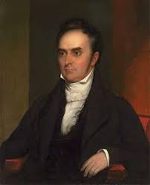Daniel Webster: Famous American Lawyer, Orator, Politician
Part 1: Early Days Daniel Webster was one of the famous orators of the late 18th Century and early 19th Century. Webster was born on Jan. 17, 1782 in Salisbury, N.H. His father, Ebenezer Webster, had fought in both the French and Indian War and the Revolutionary War. Born into a farm family, young Daniel, the second-youngest of eight siblings, grew up in that capacity and went to school at Philipps Exeter Academy, studying the classics, and Dartmouth College, from which he graduated in 1801. At times, he struggled with poor health; during his recoveries, he read works by famous authors. A gifted speaker and dedicated researcher, he proved himself a good lawyer. Admitted to the bar in 1805, he started practicing in Boscawen that same year. Two years later, he opened a practice in the larger town of Portsmouth. He spent 10 years in his Portsmouth, handling more than 1,700 cases. Opposed to the War of 1812, Webster gave one of his first well-known public speeches on July 4, 1812; war had just been declared, and he spoke out against it. Webster had taken an early interest in politics but only as a supporter. He campaigned for candidates of the Federalist Party, including presidential Charles C. Pinckney. He decided to run for office himself in 1812 and was elected to the U.S. House of Representatives that year and served two terms. In 1816, he went back to the law. 
He became a fixture before the Supreme Court, arguing dozens and dozens of cases in his 40 years of being a lawyer. It was in 1819 that he appeared before the U.S. Supreme Court in the landmark case Dartmouth College v. Woodward, the first of three very famous cases argued by Webster that resulted in the Court's reaffirming the supremacy of the federal government. In this particular case, Chief Justice John Marshall agreed with Webster's argument that the Contracts Clause of the U.S. Constitution protected the rights of a corporation (in this case, Dartmouth College) from having its board of trustees membership changed by a state legislature. That same year, Webster was again before the Court, again arguing for the supremacy of the federal government, in the landmark banking case McCulloch v. Maryland. The state bank of Maryland had attempted to impose its authority on the federal Bank of the United States by imposed a tax on all banks that were operating within Maryland state borders without having a charter approved by the state government (which, at the time, was only the Baltimore branch of the Bank of the United States). Webster agreed and the entire Supreme Court agreed that not only did the federal government have the right to have a central bank (by virtue of implied powers within the Necessary and Proper Clause of the Constitution), but also that a state bank had no authority over a federal bank.In 1824, Webster secured another victory for supremacy of the federal government when the Supreme Court agreed with his arguments in Gibbons v. Ogden. Resolving a disputes between steamboat operators, the Court held that the State of New York could not grant a monopoly to Robert Fulton and Robert Livingston–or to anyone else–because the steamships were operating between states, resulting in interstate commerce, which was the exclusive right of the federal government to regulate.Seeking a return to politics, Webster won election to the U.S. House in 1822 and served two terms. He won election to the U.S. Senate in 1826. Next page > Later Days > Page 1, 2 |
|
Social Studies for Kids
copyright 2002–2026
David White



 A venerable statesman, he served in both houses of the U.S. Congress and as Secretary of State and. A successful lawyer, he was known for his successful arguments before the Supreme Court in three of the nation's first landmark cases.
A venerable statesman, he served in both houses of the U.S. Congress and as Secretary of State and. A successful lawyer, he was known for his successful arguments before the Supreme Court in three of the nation's first landmark cases.
